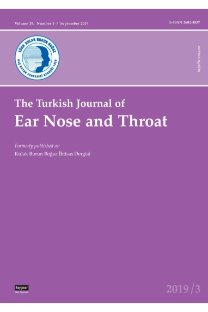Adaptation and validation of Turkish version of tonsil adenoid health status instrument
___
- Hall MJ, Schwartzman A, Zhang J, Liu X. Ambulatory Surgery Data From Hospitals and Ambulatory Surgery Centers: United States, 2010. Natl Health Stat Report 2017;102:1-15.
- Mitchell RB, Archer SM, Ishman SL, Rosenfeld RM, Coles S, Finestone SA, et al. Clinical Practice Guideline: Tonsillectomy in Children (Update)- Executive Summary. Otolaryngol Head Neck Surg 2019;160:187-205.
- Paradise JL, Bluestone CD, Colborn DK, Bernard BS, Rockette HE, Kurs-Lasky M. Tonsillectomy and adenotonsillectomy for recurrent throat infection in moderately affected children. Pediatrics 2002;110:7-15.
- Stewart MG, Friedman EM, Sulek M, deJong A, Hulka GF, Bautista MH, et al. Validation of an outcomes instrument for tonsil and adenoid disease. Arch Otolaryngol Head Neck Surg 2001;127:29-35.
- Aronoff M, Ress-Miller J, editors. Languages of the World. Linguist: Blackwell Publishers; 2008.
- Ozkırış M, Kapusuz Z, Saydam L. The frequency of adenotonsillectomies in relation to socioeconomic status among primary school students in Yozgat province. Turk J Pediatr 2013;55:74-7.
- Baugh RF, Archer SM, Mitchell RB, Rosenfeld RM, Amin R, Burns JJ, et al. Clinical practice guideline: tonsillectomy in children. Otolaryngol Head Neck Surg 2011;144:S1-30.
- Beaton DE, Bombardier C, Guillemin F, Ferraz MB. Guidelines for the process of cross-cultural adaptation of self-report measures. Spine (Phila Pa 1976) 2000;25:3186-91.
- Brazier JE, Harper R, Jones NM, O'Cathain A, Thomas KJ, Usherwood T, et al. Validating the SF-36 health survey questionnaire: new outcome measure for primary care. BMJ 1992;305:160-4.
- Robinson K, Gatehouse S, Browning GG. Measuring patient benefit from otorhinolaryngological surgery and therapy. Ann Otol Rhinol Laryngol 1996;105:415-22.
- Taber KS. The Use of Cronbach’s Alpha When Developing and Reporting Research Instruments in Science Education. Res Sci Educ 2018;48:1273-96.
- Samara L, Esteller E, Dura MJ, Guirao M, Cardesin A, Stewart M, et al. Adaptation and validation of the Spanish version of the Tonsil and Adenoid Health Status Instrument. Laryngoscope 2018;128:1469-75.
- Hays RD, Hadorn D. Responsiveness to change: an aspect of validity, not a separate dimension. Qual Life Res 1992;1:73-5.
- Steinbichler T, Bender B, Blassnigg E, Riechelmann H. Evaluation of a German version of the tonsil and adenoid health status instrument. J Otolaryngol Head Neck Surg 2014;43:41.
- Robson C, editor. Real Word Research. 3rd ed. Padstow: Wiley; 2011.
- Aydogan M, Toprak D, Hatun S, Yüksel A, Gokalp AS. The effect of recurrent tonsillitis and adenotonsillectomy on growth in childhood. Int J Pediatr Otorhinolaryngol 2007;71:1737-42.
- ISSN: 2602-4837
- Yayın Aralığı: Yılda 4 Sayı
- Başlangıç: 1991
- Yayıncı: İstanbul Üniversitesi
Seyfettin ASLAN, Yasin ÇETİNKAYA, Mehmet ÇELİK
Yüksel OLLGUN, Fatih Yunus EMRE, ASLI ÇAKIR, Günay KIRKIM, Hülya ELLİDOKUZ, Enis GÜNERİ
Berkay ÇAYTEMEL, Halime KILIÇ, Şenol ÇOMOĞLU
Nurullah SEYHUN, Ebubekir TOPRAK, Egehan SALEPCİ, Kerem Sami KAYA, Senem Kurt DİZDAR, Suat TURGUT
Reliability and validity of the Turkish version of the questionnaire of olfactory disorders
Ercan KULAK, Muhammet Enis EKİNCİOĞLU, Yavuz UYAR, Belgin TUTAR, Güler BERKİTEN, Semih KARAKETİR, Ziya SALTÜRK, Ayşe Enise GÖKER, Melis Ece ARKAN
Hakan KARA, Can DORUK, Bora BAŞARAN
Saim PAMUK, Ahmet ÖZKAN, Beldan POLAT
Kadir Serkan ORHAN, Cömert ŞEN, Levent AYDEMİR, Mehmet ÇELİK, Meryem Nesil KELEŞ TÜREL
Adaptation and validation of Turkish version of tonsil adenoid health status instrument
Egehan SALEPCİ, Kerem Sami KAYA, Senem KURT DİZDAR, Suat TURGUT, Nurullah SEYHUN, Ebubekir TOPRAK
Evaluation of cochlear implantation effects on middle ear pressure
Beldan POLAT, Hakan AVCI, Şenol ACAR, Mehmet Melih ÇİÇEK, Kadir Serkan ORHAN
